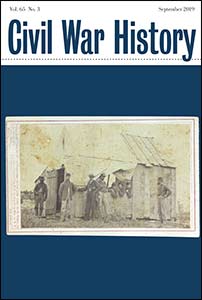September 2019, Volume 65, No. 3
Jun 4th, 2019STATE OF THE FIELD SERIES
The Internet and Civil War Studies
by Earl J. Hess
The internet has affected Civil War studies for a quarter of a century. This essay assesses its impact in six categories based not only on research but on two surveys conducted with Civil War scholars and an additional survey conducted with the staff of archival institutions. Its findings in each category are as follows: First, the web has made an enormous amount of published primary material available to historians. Second, staff members of archival institutions have encountered many limitations in their efforts to scan and place large amounts of unpublished primary material on the internet. Third, there is no evidence that the internet has enhanced the ability of scholars to market and sell their books. Fourth, the internet apparently has not fostered increased collaboration among Civil War historians. Fifth, and the most striking finding of this essay, most Civil War historians do not trust, like, or participate in social media. Sixth, the multitude of informational websites concerning Civil War topics on the internet pose a daunting task for any scholar who wishes to assess, use, or criticize them.
“The Last and Most Precious Memento”: Photographic Portraiture and the Union Citizen-Soldier
by James Andrew Brookes
This article is the first extended examination of photographic portraiture’s relationship with the Union citizen-soldier of the American Civil War. The citizen-soldier employed photographic portraiture on an unprecedented scale in military history, and defined its use as a talisman of healing in modernizing warfare. The paper focuses on how soldiers employed photography in the management of distance, disability, and death. Developments in photography ensured that there was an accessible, transferable, and robust visual form that was complementary to the needs of northern volunteers. By engaging in the rituals of exchange of photographs between the domestic and martial spheres, volunteers transformed the ways in which soldiers could manage conflict by supplementing the written correspondence that flowed to and from the armies with an innovative visual dynamic.
The History of the Tangier Difficulty: The American Civil War in Morocco
by Graham H. Cornwell
This article examines a diplomatic incident in Tangier, Morocco in February 1862, when the U.S. Consul, James DeLong, hired Moroccan soldiers to arrest two Confederate sailors from the Sumter who had traveled to Tangier aboard a French ship, the Ville de Malaga. Tangier in the 1860s was Morocco’s diplomatic capital and its primary trading port, and its growing European population looked to capitalize on liberal trade agreements forced on Morocco after a military defeat to Spain in 1860. The arrest of the two sailors led to a riot of Tangier’s European population in the city streets, the landing of U.S. Marines on Moroccan soil, and a brief international crisis that cost DeLong his post. The Sumter and its crew were confined to Gibraltar throughout the incident, under the watchful eyes of the U.S. Consul and U.S. naval vessels circling the Bay of Algeciras. Yet these parties were powerless to act on British territory, and so DeLong—only twelve miles away in Tangier—decided to make the extraterritorial arrest of the two rebels. Morocco’s deteriorating sovereignty viz-à-viz Western imperial powers in 1862 made DeLong’s actions possible, but it also made it deeply controversial amongst the consular and mercantile community based in Tangier. In the end, Morocco was not a neutral country in the Civil War, and its decision to fully back the Union was integral to the partial success of the arrest. This paper contributes to the growing literature on the globalized Civil War by showing how the expanded rights and privileges of European consuls and merchants in Morocco figured into the course of an American conflict.
James Andrew Brookes is a Ph.D. candidate at the University of Nottingham (UK), where he completed a B.A. and M.Res. in American Studies in 2013 and 2015 respectively. He has been awarded an AHRC Fellowship at the Library of Congress’ Kluge Center (2017) and won the British Association for American Studies’ Postgraduate Essay Prize (2015). His research examines Civil War art created by, or relating to, the ordinary citizen-soldier.
Graham H. Cornwell is Assistant Dean of Research in the Elliott School of International Affairs at George Washington University. He earned his Ph.D. in Middle East History from Georgetown University, where his work was supported by an ACLS/Mellon Dissertation Completion Fellowship, a Fulbright-Hays Doctoral Dissertation Research Abroad, and an American Institute for Maghrib Studies Long-Term Research Grant.
Earl J. Hess is Stewart W. McClelland Chair in History at Lincoln Memorial University and the author of more than 20 books on Civil War history. He has received several awards for his work including the 2016 Tom Watson Brown Book Award of the Society of Civil War Historians for Civil War Infantry Tactics: Training, Combat, and Small-Unit Effectiveness.
Book Reviews
Blight, David W. and Jim Downs, eds. Beyond Freedom: Disrupting the History of Emancipation. Reviewed by Nina Silber.
Mathisen, Eric. The Loyal Republic: Traitors, Slaves, and the Remaking of Citizenship in Civil War America. Reviewed by Joseph P. Reidy.
Lewis, Kay Wright. A Curse upon the Nation: Race, Freedom, and Extermination in America and the Atlantic World. Reviewed by Stephen E. Maizlish.
O’Connor, Peter. American Sectionalism in the British Mind: 1832-1863. Reviewed by Angela Murphy.
Finseth, Ian. The Civil War Dead and American Modernity. Reviewed by Thomas J. Brown.
Ecelbarger, Gary. Slaughter at the Chapel: The Battle of Ezra Church, 1864; Hess, Earl J. The Battle of Peach Tree Creek: Hood’s First Effort to Save Atlanta. Reviewed by Christopher M. Rein.
Spence, Richard Douglas. Andrew Jackson Donelson: Jacksonian and Unionist. Reviewed by Anthony A. Repucci.
Harris, William. Two against Lincoln: Reverdy Johnson and Horatio Seymour, Champions of the Loyal Opposition. Reviewed by Kanisorn Wongsrichanalai.


